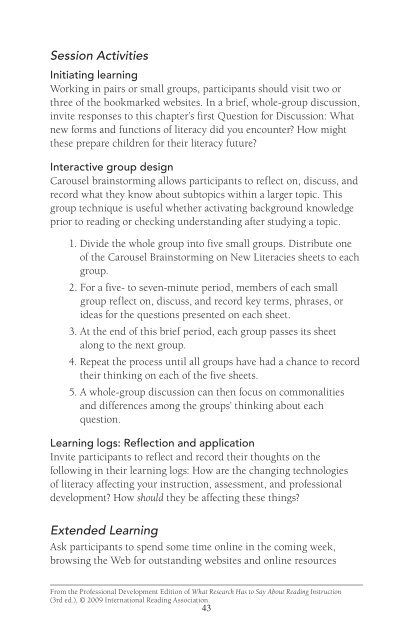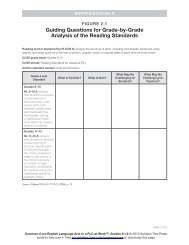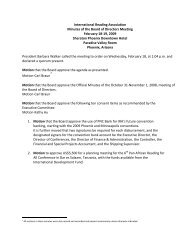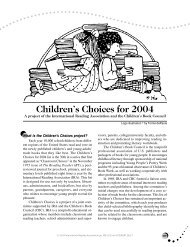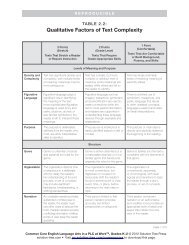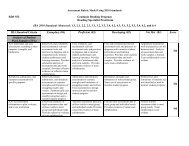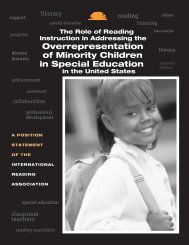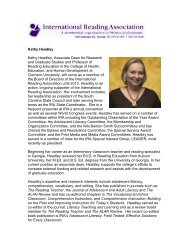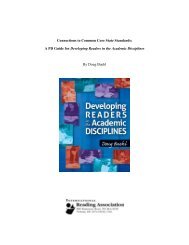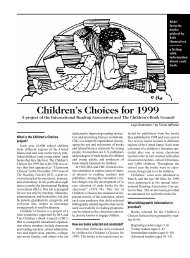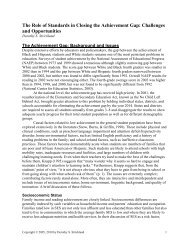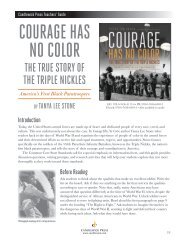What Research Has to Say About Reading Instruction - International ...
What Research Has to Say About Reading Instruction - International ...
What Research Has to Say About Reading Instruction - International ...
You also want an ePaper? Increase the reach of your titles
YUMPU automatically turns print PDFs into web optimized ePapers that Google loves.
Session Activities<br />
Initiating learning<br />
Working in pairs or small groups, participants should visit two or<br />
three of the bookmarked websites. In a brief, whole-group discussion,<br />
invite responses <strong>to</strong> this chapter’s first Question for Discussion: <strong>What</strong><br />
new forms and functions of literacy did you encounter? How might<br />
these prepare children for their literacy future?<br />
Interactive group design<br />
Carousel brains<strong>to</strong>rming allows participants <strong>to</strong> reflect on, discuss, and<br />
record what they know about sub<strong>to</strong>pics within a larger <strong>to</strong>pic. This<br />
group technique is useful whether activating background knowledge<br />
prior <strong>to</strong> reading or checking understanding after studying a <strong>to</strong>pic.<br />
1. Divide the whole group in<strong>to</strong> five small groups. Distribute one<br />
of the Carousel Brains<strong>to</strong>rming on New Literacies sheets <strong>to</strong> each<br />
group.<br />
2. For a five- <strong>to</strong> seven-minute period, members of each small<br />
group reflect on, discuss, and record key terms, phrases, or<br />
ideas for the questions presented on each sheet.<br />
3. At the end of this brief period, each group passes its sheet<br />
along <strong>to</strong> the next group.<br />
4. Repeat the process until all groups have had a chance <strong>to</strong> record<br />
their thinking on each of the five sheets.<br />
5. A whole-group discussion can then focus on commonalities<br />
and differences among the groups’ thinking about each<br />
question.<br />
Learning logs: Reflection and application<br />
Invite participants <strong>to</strong> reflect and record their thoughts on the<br />
following in their learning logs: How are the changing technologies<br />
of literacy affecting your instruction, assessment, and professional<br />
development? How should they be affecting these things?<br />
Extended Learning<br />
Ask participants <strong>to</strong> spend some time online in the coming week,<br />
browsing the Web for outstanding websites and online resources<br />
From the Professional Development Edition of <strong>What</strong> <strong>Research</strong> <strong>Has</strong> <strong>to</strong> <strong>Say</strong> <strong>About</strong> <strong>Reading</strong> <strong>Instruction</strong><br />
(3rd ed.), © 2009 <strong>International</strong> <strong>Reading</strong> Association.<br />
43


